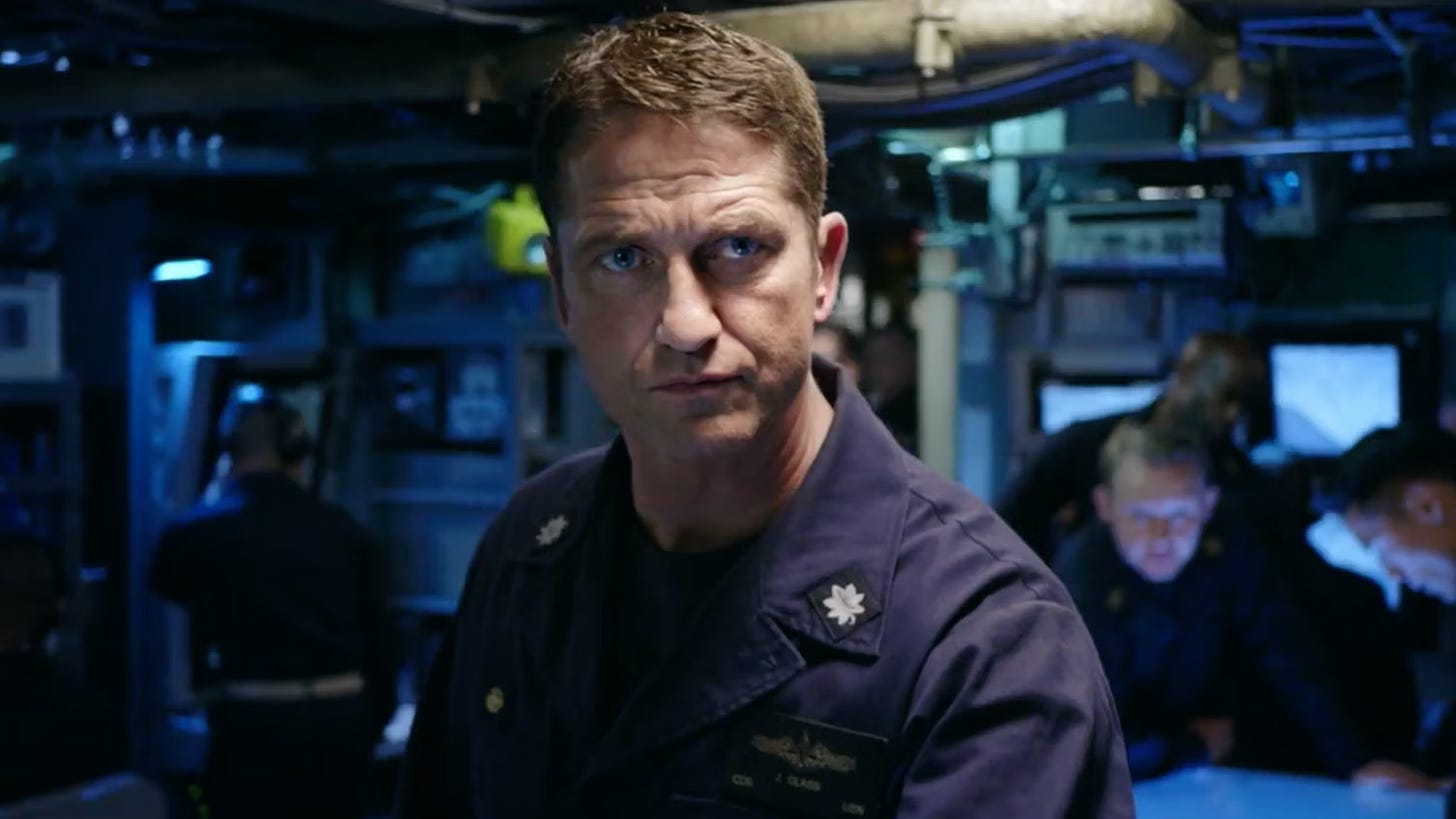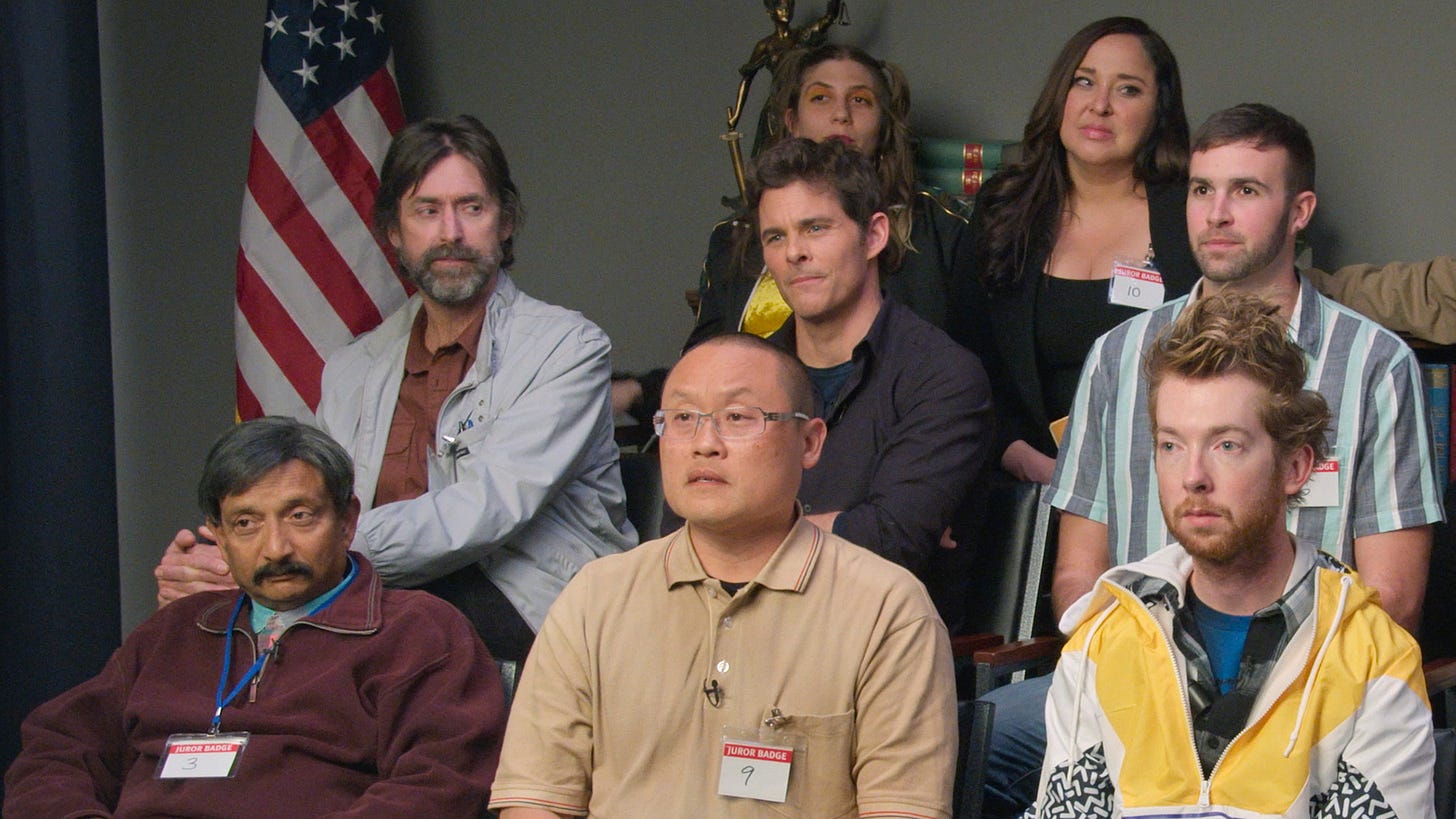There’s something gratifying about an actor who has found his or her niche. Conventional wisdom tells us that we like actors with “range,” but that isn’t always true. We can be just as fond of an actor who has a limited range, but also works within that range exceedingly well. There’s a comforting dependability of knowing that when you pop on a certain kind of movie featuring this actor, they’re going to deliver because they’re great given particular parameters.
This past weekend, I finally1 got around to watching Hunter Killer starring Gerard Butler, and I couldn’t help but enjoy Butler fully enjoying his domain as the king of B-movies.
Hollywood had a tough time figuring out what to do with Butler exactly. He’s incredibly handsome, so that’s one box checked, and he’s charismatic, so that’s another. But he’s also got a thick Scottish brogue, and there’s no shortage of handsome, charismatic actors who don’t. Still, for most of the 2000s, Hollywood tried to find a place for him to little avail. They tried horror with Dracula 2000, supporting roles in action movies like Timeline and Reign of Fire, and to one of the greatest pieces of miscasting ever, his role as The Phantom in Joel Schumacher’s 2004 adaptation of The Phantom of the Opera. It’s borderline cruel casting a guy in the title role of a musical, and he can’t hit the notes.
Even when Butler broke through with his electric lead performance in 300 in 2007, Hollywood was still kind of befuddled. They now tried him as a romantic lead (P.S. I Love You, The Ugly Truth, and The Bounty Hunter) and biopic hero (Machine Gun Preacher and Chasing Mavericks). This isn’t to say that Butler can’t act (I feel like his performance as Tullus Aufidius in 2011’s Coriolanus is quite good), but it wasn’t until 2013’s Olympus Has Fallen that Butler found the kind of role where he could shine.
I don’t think Olympus Has Fallen is a good movie (I far prefer 2013’s other Die-Hard-in-the-White-House movie, White House Down), but it sets Butler up as a guy with comical levels of machismo who doesn’t wink at the camera. We’re in an age right now that’s so drenched with irony that our action heroes should never be too earnest. Earnestness invites ridicule, so the way to short circuit that is to occasionally let the audience know that you too (you being the actor, the character, and the filmmaker) are in on the joke. We have to acknowledge the absurdity of the situation. That’s not inherently bad, but it does create levels of self-awareness that almost feel like apologia.
Gerard Butler movies of the past decade reject irony. I don’t know if it’s because there’s nothing particularly ironic about Butler—he’s a big, brawny guy with a deep brogue—but he doesn’t attempt to hide in his roles. If anything, he seems to double down on the concept and never quibble with the larger plot. Hunter Killer is ridiculous in terms of its realpolitik (U.S. sailors and a SEAL team must save the Russian President from a rogue defense minister who wants to start World War III), but Butler plays the role completely straight.
What I think I find most reassuring about Butler’s performances at this stage in his career is that he’s not trying to be cool. Instead, he seems to have settled comfortably into a string of B-level action movies that he elevates because he’s not winking at the screen or sleepwalking through them to collect a paycheck. I think it’s kind of easy to look at a script for something like Plane or Greenland and feel like it’s derivative, but Butler always shows up. He may always show up as Gerard Butler: Man of Action, but I like that. He knows how to take a movie seriously so that the rest of us can have fun.
Recommendations
It only took 35 years to make a worthy sequel to Predator, but Dan Trachtenberg (10 Cloverfield Lane) did it! Prey fully owns, and now it’s making the jump from Hulu to a 4K disc. Prey creates a perfect template for future Predator movies—send the Predator to various times and places that aren’t the modern day. Prey takes place in the Northern Great Plains in 1719 and sets the Predator against Comanche and French fur traders. You haven’t lived until you’ve seen the Predator absolutely wreck a bunch of French fur traders who trying to reload their stupid muskets.
Over in Substack land, I really liked this article by Ted Gioia’s “The Honest Broker” where he points out that the AI hype is, unsurprisingly, in free fall. It is the latest in Silicon Valley’s attempts to rush to The Next Big Thing only to find that people don’t want it. We don’t want cryptocurrencies, NFTs, or the blockchain. We don’t want a metaverse. While the promise of big, earth-shaking technology may generate headlines, I believe people would just like things to work properly. I’d like it if Google worked again. I’d like it if streaming services weren’t UX nightmares. These aren’t sexy problems, but not every solution needs to be sexy.
What I’m Watching
We finished watching Jury Duty, and hoo boy, do I have mixed feelings on this one (spoilers ahead for Jury Duty and The Truman Show). Obviously, at some point they would let Ronald Gladden know the truth, and that came in the final episode. They told him everything was fake, but he was “a hero” and they awarded him $100,000. The show kicks into overdrive to show that everyone is friendly, that the actors genuinely like Ronald, and that good times were had by all. It is a sweet ending, and it does seem like they genuinely found a winning human being in Ronald Gladden among the 25,000 people who applied thinking they were part of a documentary about jury duty.
But I can’t help but thinking about The Truman Show of it all. In that framing, Truman’s life is tragic because he’s denied the freedom of his choices (the woman he loves, the opportunity to explore), but more tragically is that all of his relationships are fake. His wife doesn’t love him. His best friend doesn’t care about him. When Truman finally figures out that it’s all fake, he speaks to “The Creator”, Christof, he asks, “Was nothing real?” and Christof replies, “You were real. That's what made you so good to watch.” I feel like Jury Duty came to a similar conclusion, but softens the landing with money and praise for Ronald.
What I’m Reading
I tried to figure out why I was making my way through Tomorrow, and Tomorrow, and Tomorrow so slowly, and I figured out that I’m too emotionally invested. I can tear through nonfiction books of terrible things happening to real people, but apparently I’m too invested in this unique love story to keep turning the page. I only want good things for Sam, Sadie, and Marx! Why are you doing this to me, Gabrielle Zevin! Anyway, this book is amazing, I love it, and another reason I’m going slowly through it is part of me doesn’t want it to end.
In other reads:
Elon Musk’s Shadow Rule by Ronan Farrow [The New Yorker] - The New Yorker recently had a couple profiles on wealthy morons who are ruining everything. This profile of Musk by Farrow shows the monumental mistake the U.S. has made in outsourcing defense resources to a petulant billionaire. What baffles me is that the U.S. spends more on defense than anything else and more than other developed countries combined. Yet we had to funnel public money to this private business to launch satellites? The United States—the first country to put a man on the moon—couldn’t figure out how to launch satellites for defense communications? The military-industrial complex baffles me, but at least we’ve put decisions in the hands of the most divorced man in the history of the world.
David Zaslav, Hollywood Antihero by Clare Malone [The New Yorker] – This isn’t a bad profile of Zaslav in terms of explaining where he comes from, but he’s also just not that interesting a human being. He grew up rich, he knew how to associate with rich people, and has climbed the corporate ladder by cozying up to the right wealthy people. The problem is that he’s now at the top of the ladder and has no idea what he’s doing. Malone tries to show Zaslav some grace by arguing that any CEO would be caught in the tumult of the current media landscape, but I don’t buy that argument. Zaslav made the call to take on loads of debt so he could buy WarnerMedia from AT&T. He deserves every ounce of criticism he gets because he put himself in this position.
The Hollywood Strike Forces a Reckoning for the Trades by Katharine Trendacosta [Defector] – As the strike drags on, we shouldn’t forget that three major trade publications—Variety, The Hollywood Reporter, and Deadline—are A) all owned by the same company (Penske Media Corporation); and B) feel obligated to carry water for the studios because they need the studios’ good graces to take out expensive ads, especially For Your Consideration ads. Trendacosta’s article does a good job of highlighting this disconnect where the trades are ostensibly doing journalism, but really they’re in the business of doing PR for the studios. That being said, you don’t have to be trade to shill for the studios! Even the New York Times is getting in on the action by asking you to feel empathy for Carol Lombardini, whose job is to represent the interests of billionaires.
What I’m Hearing
I’m hearing myself! The Comics Canon was good enough to invite me back onto their show, and this time we were talking Teenage Mutant Ninja Turtles. It’s a fun episode, especially since what TMNT is now is so different from what it started as, and yet I think both versions are perfectly valid.
What I’m Playing
Still doing silly little assassinations in Hitman. That being said, I’m on track to be done in about a week or so, and will then finally turn my attention to Spider-Man: Miles Morales ahead of my most-anticipated game of the year, Spider-Man 2.
I say finally because I’ll typically see any new submarine movie as soon as possible because I love the genre so much.







Prey getting a physical media release! I’ve been hoping!